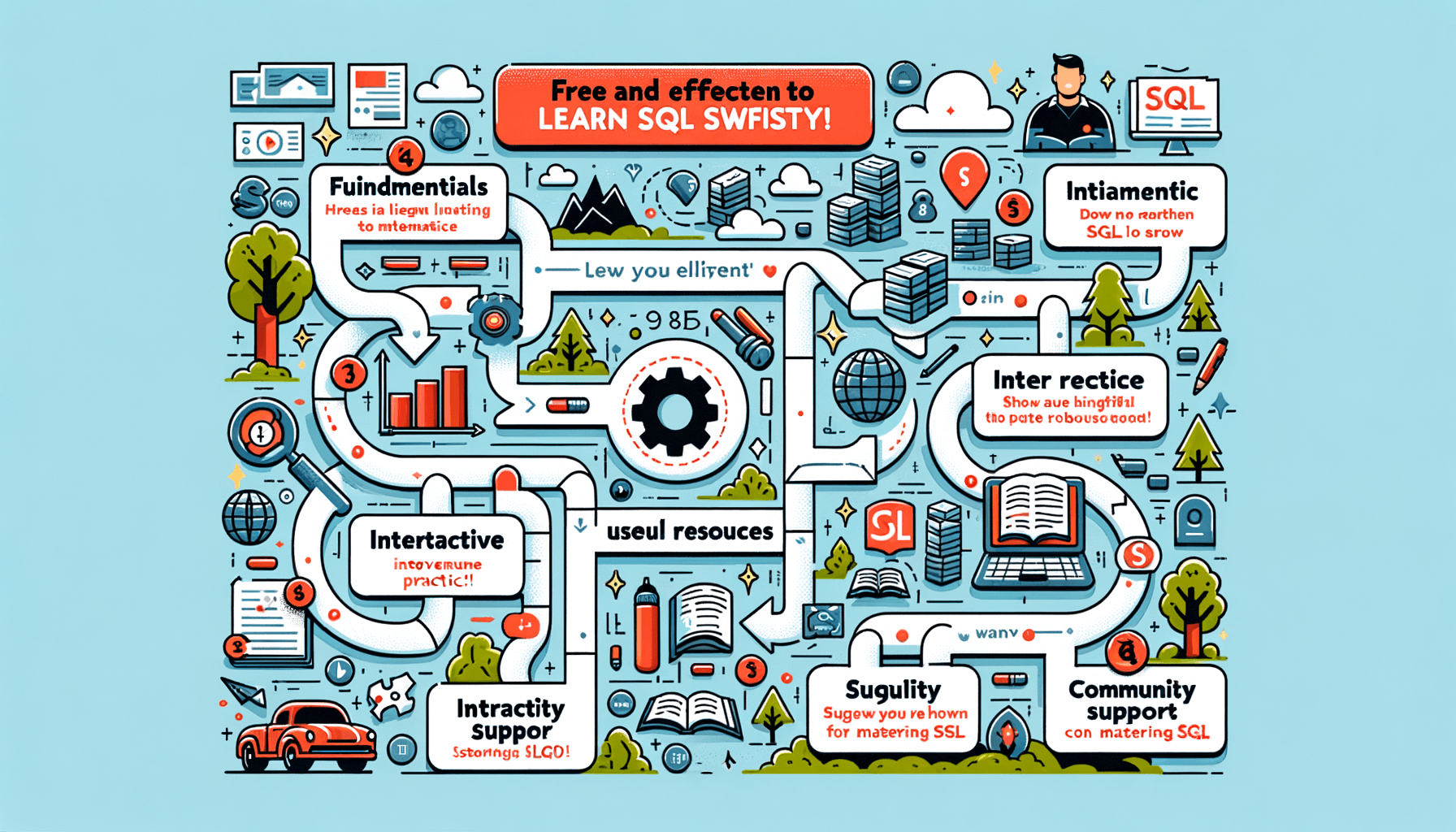A big variety of articles and resources

Mastering SQL for Real-Time Analytics: A Comprehensive Guide
 Sia Author and Instructor
Learn SQL
Sia Author and Instructor
Learn SQL
8 minute read
Understanding SQL in Real-Time Analytics
The Role of SQL in Real-Time Decision Making
SQL is pivotal in real-time decision-making processes, enabling businesses to react swiftly to changing data landscapes. SQL's ability to execute complex queries rapidly ensures that decision-makers have access to up-to-date information, crucial for maintaining a competitive edge in dynamic markets.
Key SQL Functions for Real-Time Data Processing
To handle real-time data effectively, certain SQL functions are indispensable. These include streaming functions, window functions, and real-time aggregation functions. Utilizing these functions allows for continuous data processing and timely insights, which are essential for operational efficiency.
Optimizing SQL Queries for Speed and Efficiency
Optimizing SQL queries is fundamental for enhancing performance in real-time analytics. Techniques such as indexing, query simplification, and the use of efficient joins can significantly reduce query execution time. This optimization ensures that analytics systems can handle large volumes of data without compromising on speed or accuracy.
Setting Up Your SQL Environment for Analytics
Choosing the Right SQL Database
Selecting the right SQL database is crucial for effective analytics. Consider factors like scalability, performance, and support for real-time processing. Popular choices include MySQL, PostgreSQL, and Microsoft SQL Server, each with its own strengths in handling large datasets and complex queries.
Tools and Software for SQL Analytics
To enhance your SQL environment, integrate tools that support data visualization and advanced analytics. Software like Tableau, PowerBI, or even advanced IDEs like DataGrip can significantly improve your workflow. Utilize these tools to gain deeper insights and streamline your data analysis processes.
Configuring Your SQL Environment
Proper configuration of your SQL environment is essential for optimal performance. This involves setting up the database schema, indexing, and tuning the performance settings. A well-configured environment helps in minimizing response times and maximizing efficiency in data handling. Remember, a tailored environment reduces the risk of bottlenecks during heavy data loads.
SQL Techniques for Real-Time Data Analysis
Advanced SQL Queries for Real-Time Insights
Building upon foundational skills, this section delves into the sophisticated realms of SQL, unlocking techniques pivotal for in-depth data analysis and the extraction of nuanced insights. From the power of window functions to the strategic optimization of queries, we chart a path toward transforming raw data into predictive foresights.
Using SQL Window Functions
In practice, combining CTEs with window functions can dramatically elevate your SQL game, enabling deeper analysis with cleaner, more efficient code. A common application is in data partitioning and subsequent analysis within these partitions, streamlining the process of insight generation.
Real-Time Data Aggregation and Analysis
Real-time data aggregation is essential for timely decision-making in dynamic environments. Utilizing SQL's powerful aggregation functions, such as SUM, COUNT, and AVG, allows for the efficient summarization of large datasets, providing actionable insights almost instantaneously. This capability is particularly crucial in sectors like finance and e-commerce, where speed and accuracy are paramount.
Integrating SQL with Other Analytics Tools
Combining SQL with Python for Enhanced Analysis
SQL's integration with Python revolutionizes data manipulation and analysis, allowing for more complex data operations and better insights. Python's libraries, such as Pandas and NumPy, enhance SQL's capabilities, making it a powerful tool for data scientists.
Using SQL alongside BI Tools
SQL plays a crucial role in Business Intelligence (BI) platforms like Tableau and Power BI. These tools leverage SQL to transform raw data into actionable insights through interactive dashboards and reports. SQL's role is pivotal in real-time data visualization and decision-making processes.
Real-Time Data Visualization with SQL
SQL is instrumental in visualizing data in real time. Platforms like Grafana utilize SQL to monitor and analyze trends, providing dynamic visualizations that are essential for timely decision-making. This capability is particularly important in sectors where real-time data is critical, such as finance and healthcare.
Best Practices for SQL Performance Tuning
Indexing Strategies
Proper indexing is crucial for enhancing query performance. By creating indexes on columns that are frequently used in WHERE clauses or as JOIN conditions, you can significantly reduce the search space, leading to faster query execution. Consider the cardinality and data type of the column when deciding on indexing to ensure optimal performance.
Query Optimization Techniques
Efficient query design is essential for fast data retrieval. Use specific column names in your SELECT statements instead of using SELECT * to minimize the data load. Employing techniques like proper filtering and using LIMIT for pagination can also help in managing large datasets effectively.
Hardware Considerations for SQL Databases
Selecting the right hardware can impact the performance of your SQL database. Ensure that the server has sufficient RAM and a fast CPU to handle large volumes of queries and data processing. Disk speed is also critical; SSDs can offer faster data access compared to traditional hard drives. Scalability should be considered to accommodate growing data and user demands.
Case Studies: SQL in Action
E-commerce Analytics
In the realm of e-commerce, SQL plays a pivotal role in enhancing user experience and driving sales. By analyzing customer behavior and transaction data, SQL helps in sculpting personalized recommendations. SQL databases power the recommendation engines that suggest products based on past purchases and browsing habits, significantly boosting sales.
Financial Market Monitoring
SQL's ability to handle large volumes of data in real-time makes it indispensable for financial market monitoring. It enables the rapid analysis of market trends and transactions, helping financial analysts make informed decisions swiftly. The use of SQL joins and aggregations facilitates this complex data handling, ensuring precision and speed in insights.
Healthcare Data Analysis
Healthcare institutions leverage SQL to manage and analyze vast amounts of patient data. SQL queries are crucial for tracking patient outcomes and optimizing treatment plans. Through the use of SQL window functions and real-time data aggregation, healthcare professionals can gain immediate insights into patient trends and treatment efficacy.
Troubleshooting Common SQL Issues in Analytics
Dealing with Data Skew
Data skew in SQL can significantly impact the performance of queries. To address this, ensure data is evenly distributed across the database. Techniques such as partitioning and proper indexing can help mitigate data skew issues. Regular monitoring and adjustments are crucial for maintaining optimal performance.
SQL Query Debugging
Debugging SQL queries is essential for maintaining the integrity and performance of your data operations. Start by isolating the problematic part of the query and check for syntax errors or logical mistakes. Utilizing EXPLAIN plans can provide insights into the query execution path and help identify bottlenecks.
Handling Large Data Volumes Efficiently
Efficient management of large data volumes is key in SQL analytics. Implement strategies like data archiving, proper indexing, and query optimization to handle large datasets. Consider using batch processing or incremental loading to manage data loads effectively.
By addressing these common SQL issues, analytics professionals can ensure smoother and more efficient data operations.
Conclusion
In this comprehensive guide, we've explored the essential aspects of mastering SQL for real-time analytics. From understanding the basics to implementing advanced techniques, SQL remains a powerful tool for data-driven decision-making. As you continue to practice and apply these skills, remember that the journey to mastery is ongoing. Stay curious, keep learning, and leverage SQL to unlock the full potential of your data analytics capabilities. Whether you're a beginner or looking to refine your skills, this guide serves as a foundational resource for enhancing your proficiency in SQL for real-time analytics.
Frequently Asked Questions
What is real-time analytics in SQL?
Real-time analytics in SQL refers to the ability to use SQL queries to analyze and obtain insights from data as it is being collected, enabling immediate decision-making and actions based on current data.
How does SQL help in real-time decision making?
SQL enables real-time decision making by allowing users to quickly access, query, and analyze live data streams, providing timely insights that can influence business strategies and operations.
What are key SQL functions for real-time data processing?
Key SQL functions for real-time data processing include stream processing functions, window functions, and real-time aggregation functions, which help in managing and analyzing data flows efficiently.
How can SQL queries be optimized for better performance?
Optimizing SQL queries for better performance involves techniques like indexing, query refactoring, using appropriate joins, and minimizing the use of subqueries to reduce the computational load and improve execution speed.
Can SQL be integrated with other analytics tools?
Yes, SQL can be seamlessly integrated with other analytics tools such as Python, R, and various Business Intelligence (BI) tools to enhance data analysis capabilities and provide more comprehensive insights.
What are some common SQL issues in analytics and how can they be addressed?
Common SQL issues in analytics include data skew, inefficient queries, and handling large data volumes. These can be addressed by proper indexing, query optimization, and using techniques like partitioning and proper hardware scaling.
Related Articles

10 Effective Tips on How to Learn SQL Online
9 minute read

A Comprehensive Guide to Learn SQL for Analysts
8 minute read


